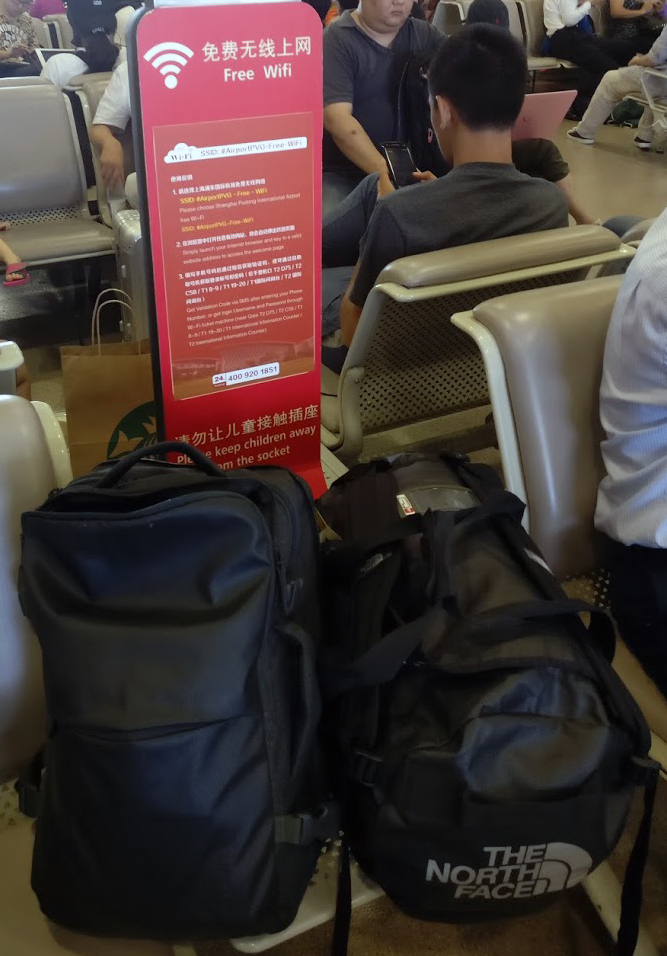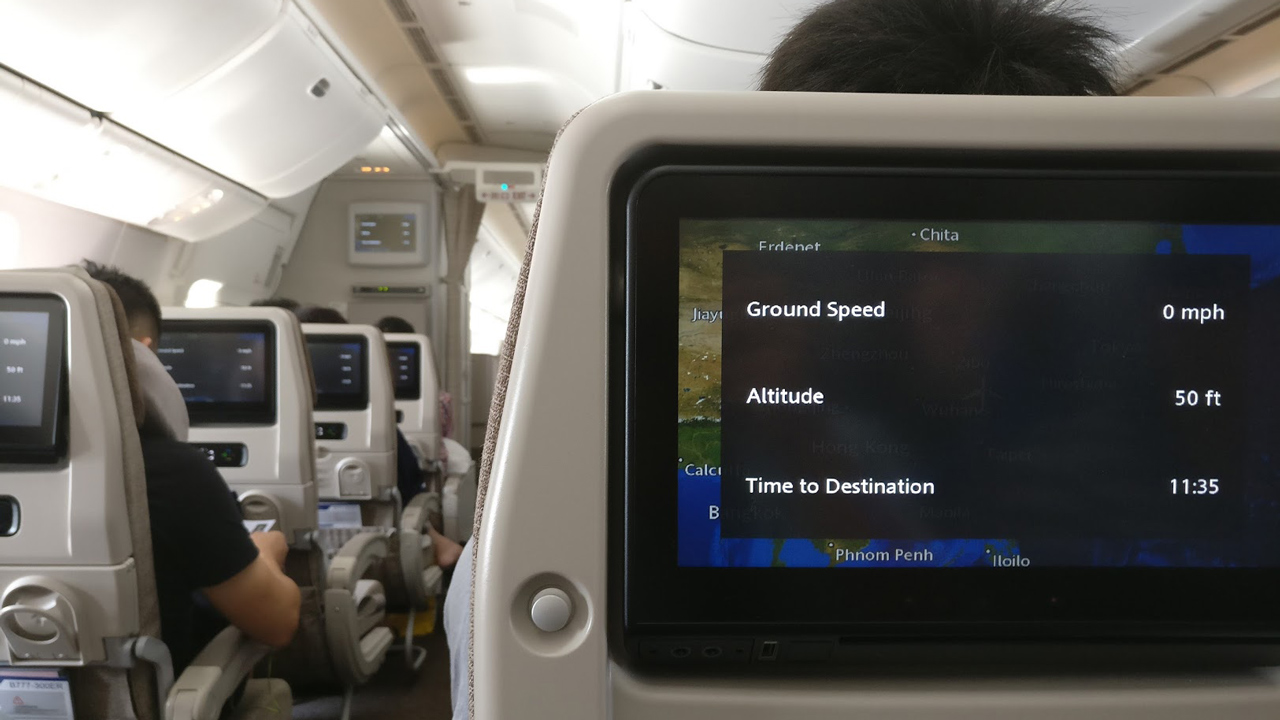I almost missed my flight back to the States. While the ticket says August 18 at 12:15 AM (which is technically Wednesday’s night), I for some stupid reasons thought it was scheduled for Thursday’s night. Probably, I wasn’t really keen on coming back, so I didn’t really pay much attention on the return date. Home does have a reputation of spoiling the hell out of me.
So at 9:30 PM on August 17, I received an email notifying me that my flight to Shanghai was on time (12:15 AM). Panic mode was in full force as I had not packed a single thing. My whole family owned the situation, though, and I made it to the airport an hour and a half before the boarding time.

Then, there I was in Shanghai for 8 hours before the next flight to Los Angeles. That was when I got to actually experience China’s internet (more like intranet, in fact). It’s almost like a version of the net designed specifically for the Chinese people and no one else.
First, getting on wifi at Shanghai’s Pudong International Airport was a pain. Literally, You need a local number to get the verification code to connect to the free wifi. How was I going to have a local number and why would I need one? I was just transferring. Then, there was the option to use a wifi ticket from one of the wifi machines that I could never find in the terminal.
Carrying one backpack and one duffle bag around to find a wifi ticket machine was no fun at all, especially when I was told to stand at the information desk waiting for someone to answer the wifi questions for quite a long while. That person never showed up! I guess the best I could say about the situation was a good 30-minute workout session.

The local number and wifi ticket systems were probably a proof of China trying to create its own isolated internet or “intranet.” While not finding the wifi ticket machine could have just been an unfortunate coincidence, requiring a local number to connect to the wifi meant only one thing, at least to me, “If you are not living in China, the wifi is not really for you. You are going to find the intranet different from the internet you are accustomed to.”
I didn’t give up on getting connected. Eight hours without being online in some ways would have been just sad. I found Starbucks, but again this favorite Iced Latte maker of mine relied as well on the airport wifi, which was another sad, sad news. I was finally salvaged by a wonderful waitress at a Chinese restaurant in which I had lunch. She typed in some numbers and I was on cloud nine only to find out later she logged me into the Chinese version of the isolated internet, what many are calling “the intranet.”
I was excited. Finally, my phone was no longer a lone wolf. My instinct was to open the Facebook messenger app and inform my family about my whereabouts, but I was welcomed with an offline Facebook. That particular moment I truly realized I was in China. I then switched to the browser trying to google how to use Facebook in China, but Google search was out of reach, too. I went blank for a second, not knowing to which website to go exactly. Usually, everything starts with a Google search for me, but that was not possible. I didn’t remember clearly what the official Chinese search engine was either. I was stuck for quite some time. At that point, it came to me how much I relied on Google and Facebook for my entire internet usage.
Luckily, WhatsApp works in China, and that was how I could connect with my family and friends. I asked them to Google what the Chinese search engine was. Baidu (baidu.com) was what I was looking for, and from that point on, I began experiencing China’s infamous intranet.
What is the intranet, exactly?
China is probably the biggest state actor to implement extreme internet censorship. Google, Twitter, YouTube, Facebook and a bunch of other popular Western internet services are banned in this country, mainly and on one side of the arguments due to its accused effort to hide its long record of human rights violations. On the other side of the arguments, China blocks these Western-based services to prevent Western influence and dominance in the country.
With such major internet services blocked, a generation of technology copycats that later became successful technology giants was born and might have even projected a guide to the future of the internet. The New York Time did a great video piece explaining how Chinese internet companies are first copying, then evolving and innovating so fast and meaningfully that Western apps are copying from them back.
WeChat, mentioned in the video, is the super app that combines together Facebook, Amazon, eBay, Yelp, PayPal, Skype, Uber and many, many more. It is, above all else, an all-in-one window to a complete digital-physical lifestyle, through which people eat, meet, shop, travel, and get paid within one powerful, unified application.
The success of WeChat, in my opinion, is the result of China’s internet atmosphere distorted by government censorship and filter that give birth to the so-called intranet: basically the internet exclusive to the Chinese people and only them.
The advantage WeChat has while operating inside the intranet is that the people it’s serving are highly homogenous, culturally, politically and socioeconomically. They have the same tradition, mindset and way of life. They use the same currency. They are bound by the same legal system. They share all the amenities, although certain are exclusive for the extreme rich. After all, the intranet users are inside one country that is the rising China, and there are lots of them, 700 million to be exact.
Having a highly homogenous group of 700 million customers is what allows WeChat to reach economy of scale and scope to quickly build amazing, unified features it has today. Facebook is one of the few Western internet companies that might have a shot in replicating WeChat’s success, and it is trying to do just that. Facebook has been introducing a variety of WeChat-inspired features to its messenger app, major one of which is money transfer that aims to be peer-to-peer monetary transactions, the backbone of e-commerce at the individual level and of the whole internet economy in general. However, Facebook’s 1.7 billion users are 1.7 billion miles away from homogeneity. To provide a unified experience like WeChat, Facebook has to deal with all countries’ unique legal, financial and cultural systems. It’s bloody difficult and time consuming. WeChat doesn’t have to face this challenge in China, operating inside intranet. Maybe, China’s intranet or isolated internet is not a bad thing, after all. But is it really?
The truth is any country that is not China, or probably India, might not have the luxury of reaping the benefits of the isolated internet. Not every country has one billion plus population.
In my opinion, intranet or isolated internet—while somehow forging a healthy digitally-connected environment for China through culturally, politically and socioeconomically homogenizing the massive amount of users—might hurt the Chinese people in some ways as well. Chinese citizens are doing great inside China’s intranet until they have to go out of the country.
Imagine having to contact a Western-based organization for a job opportunity or other kinds of purposes. Will it be possible to send an email to someone who uses a Microsoft-based or Google-based email server? There are hacks available that Chinese tech savvy individuals can utilize to escape the great firewall, but inconvenience usually take a toll and most may just resort to the comfort of using Chinese native internet services, thus being isolated from the global netizens.
There can be a whole lot of socialization problems in addition to the issue of access I just mentioned as well. Most significantly, the biggest problem is privacy. Intranet is the product of government’s effort to control the internet end-to-end, collecting every single set of data about its own people. It’s creepy. It’s scary.
Privacy, nonetheless, is a concern everywhere, not just in China. The global internet itself sees governments trying to surveil their citizens for the sake of national security, at least that’s what they claim. National security and privacy have become topics of a heated debate particularly since the 9/11 attacks. It should not be a zero-sum situation. National security and privacy should be protected at the same time, and stakeholders must work together to come up with win-win solutions to achieve both.
I’m writing this post just to share my experience using the infamous intranet of China. You are welcomed to join the discussion on the good and the bad of China’s isolated internet or intranet. Would you want intranet in your country? Why or why not?
Alright, Shanghai was just part of my journey back to Ohio University, my second home where I hibernate and train to increase my mental, physical and intellectual strength. Here are some of the photos and what happened along the way.















Such a nice article to read about the internet or better called “intranet” in China. I heard the same experience from my friend who had his flight transfer in China. And your analysis on how population of China makes this so-called intranet possible is really unconventional. Thanks for the article.
Good point on the “intranet” and “one app unifies everything”. As a Chinese living abroad, I also found it annoying when I have to provide my Chinese bank info and local phone number in order to access to some social media or use some apps. It’s also hilarious — I don’t have bank cards that are associated with my WeChat so I cannot open my own official WeChat account (like a blog), even a blog has nothing to do with the bank information? I have never been to Shanghai, but I am sure not all airports strictly limit their WIFI — at least Beijing international airport does not. Otherwise I will have no way to find my way home…Also, Baidu is the Chinese version of Google; renren is the Chinese version of Facebook…It is also interesting that given Chinese government forbid citizens to use these MP, the Chinese version of everything forbidden is popular there …LOL